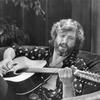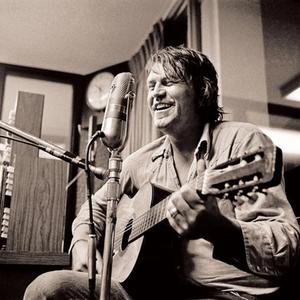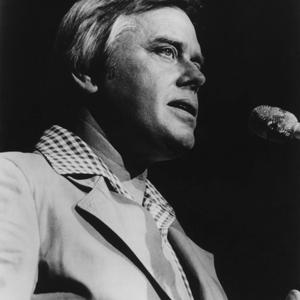




Link copied


Subscribe and Listen to Holler's Best Kris Kristofferson Songs Playlist above:
A legendary songwriter and kingpin of outlaw country music, Kris Kristofferson’s literary approach to songcraft came to define an era.
While many of his songs feature down-on-their-luck protagonists, Kristofferson’s life has been anything but, and as well as releasing solo versions as an artist in his own right, he wrote hits for Johnny Cash, Janis Joplin and Sammi Smith among others, and joined forces with Cash, Waylon Jennings and Willie Nelson to form the legendary super-group, The Highwaymen.
The multi-award winning singer, songwriter and actor died at the age of 88 on September 28th 2024 at his home is Hawaii.
Holler looks back on the life and songs of one of country music's true originals in our Best Kris Kristofferson Songs list below.
Good Morning John
Taken from Kristofferson's 20th studio album, Closer to the Bone from 2009, which he described as "a reflective album... about making sense of life at this end of the game."
Kristofferson wrote ‘Good Morning John’ for Cash in a bid to support his friend’s bid for sobriety.
"The song’s direct and heartfelt language expresses his love and respect for Cash and demonstrates the vulnerability that so often gives Kristofferson’s work its gravity.
“I love you, John / In the cold and holy darkness / You were always shining brighter than a star”.
They Killed Him
Another in Kristofferson’s catalog that Cash recorded prior to its writer, ‘They Killed Him’ is a tribute to the lives and martyrdom of Kristofferson’s heroes Mahatma Gandhi, Martin Luther King, JFK, Robert F Kennedy and Jesus Christ included on his 1986 album Repossessed.
The song resonated with Bob Dylan as well as The Highwaymen, who both released studio and live versions of the song.
For the Good Times
‘For the Good Times’ established Kristofferson as a top songwriter after Ray Price turned the bittersweet song about the end of a love affair into a #1 in 1970.
The song soon established its own renown through countless other interpretations, including those by Al Green, Willie Nelson, Dolly Parton and The Little Willies.
From The Bottle To The Bottom
At the same time as his performance and movie careers were taking off, Kristofferson released a series of albums with his then-wife and singer Rita Coolridge, resulting in yet another string of hits.
‘From the Bottle to the Bottom,’ from their Full Moon album of duets in 1973, won the pair a Grammy after it had been first recorded in 1969 by Billy Walker and the Tennessee Walkers.
Jesus Was A Capricorn (Owed To John Prine)
Written as a nod to John Prine, whose work he admired, the title track of Kristofferson’s 1972 record serves as both social critique and personal credo.
Like a lot of his material, the song humourously picks apart the act of othering and the reductive tendency of people to turn against each other and alienate them according to perceived differences, such as ethnicity, skin colour, religion, gender or sexual orientation.
"Eggheads cursin' rednecks cussin' Hippies for their hair / Others laugh at straights who laugh at freaks who laugh at squares," he sings. "Some folks hate the whites who hate the Blacks who hate the Klan / Most of us hate anything that we don't understand."
"I wrote 'Jesus Was A Capricorn (Owed To John Prine)' because I was so influenced by John. When I heard his songs I felt like his writing had kicked me into doing it," Kristofferson told Graeme Thomson of Uncut in 2016. "You take things from all over the place, though you don't always admit it! I was really influenced by Roger Miller, Shel Silverstein and Mickey Newbury. Everybody you admire influences you somehow in your art."
Nobody Wins
As Kristofferson began parlaying his musical success into an equally golden movie career, his songs continued to find favor among other singers.
Brenda Lee’s version of this devastatingly clear-eyed assessment of love gone wrong became a hit the same year Frank Sinatra included it on Ol Blue Eyes is Back.
Loving Her Was Easier
The commercial success of ‘Loving Her Was Easier’ established Kristofferson as a performing artist as much as a songwriter, despite describing his his raspy voice as a "frog" voice to Fred Foster when he was signed to Monument Records.
"I can't sing, I sound like a frog!" he told Foster at the time.
Having ascended the Adult Contemporary charts upon its release, the song was subsequently covered by many country artists, including Bobby Bare and fellow Highwaymen Waylon Jennings and Willie Nelson, as well as regendered versions by Billie Jo Spears and Tina Turner.
Closer To The Bone
The title track to Kristofferson’s 20th studio album from 2009 is a spare, reflective and surprisingly upbeat song.
The song is about living while facing down one’s own mortality, distilling many of the guiding principles which fueled Kristofferson’s remarkable life: “Singing to the starlight / Over the horizon / Open to the pleasure / Equal to the pain”.
Please Don't Tell Me How The Story Ends
Another perennial classic, Ronnie Milsap was the first to make this tale about two lovers seizing the moment a hit.
Kristofferson would release several versions over his career (including one with soon-to-be ex Coolridge on Natural Act), while Nelson, Bobby Bare and Buddy Miller recorded notably moving versions.
Here Comes That Rainbow Again
Based on Chapter 15 of John Steinback’s Pulitzer Prize-winning book The Grapes of Wrath, ‘Here Comes the Rainbow Again’ is about a poor farm family during The Great Depression.
Recorded by Cash, Kristofferson included it on his collaborative album with Nelson, Lee and Dolly Parton, The Winning Hand, in 1982 epitomizing his expert hand at telling a nuanced story in song.
Why Me
Kristofferson turned a personal low point into the biggest hit of his career with this gospel tinged song about surrendering to Christ amid a cathartic church service.
Written after having attended a religious service conducted by the Rev. Jimmie Rogers Snow, Kristofferson said that he had never thought of needing help, but he was at a low point in his life and when the pastor asked the congregation, "Is anybody feeling lost?" "Up goes my hand," Kristofferson says.
The Pastor then asked, "Are you ready to accept Christ? Kneel down there." "I'm kneeling there," Kristofferson continues, "and I carry a big load of guilt around... and I was just out of control, crying. It was a release. It really shook me up."
Kristofferson later said, "It was just a personal thing I was going through at the time. I had some kind of experience that I can't even explain."
Recorded by Kristofferson in 1972, the song featuring backing vocals by soon-to-be wife Rita Coolidge and up-and-coming singer-songwriter Larry Gatlin and was to be Kristofferson's lone major country hit as a solo recording artist, reaching No. 1 on the Billboard Hot Country Single chart in July 1973, and as with so many of his songs, the song moved other artists as much as audiences, notably Elvis, who performed it regularly throughout the 1970s.
To Beat The Devil
With its earnest, spoken word intro, half-sung verses and air of determination, ‘To Beat the Devil’ is a testament to the power of upholding one's own integrity and one of Kris Kristofferson's finest recorded moments.
The song appears on Kristofferson’s self-titled debut album from 1970 on Monument, which also features 'Me and Bobby McGee,' 'Sunday Morning Coming Down' and 'Just the Other Side of Nowhere.' That's some debut album!
"A couple of years back I come across a great and wasted friend of mine in the hallway of a recording studio," Kristofferson begins in the spoken word intro. "And while he was reciting some poetry to me that he had written, I saw that he was about a step away from dying, and I couldn’t help but wonder why. And the lines of this song occurred to me."
"I'm happy to say he’s no longer wasted, and he’s got him a good woman," he continues. "And I’d like to dedicate this to John and June, who helped showed me how to beat the devil."
The song he offers up as a token of redemption to Cash, his mentor and hero, is a tale of a face to face with the devil to bargain for the songwriter's talents.
The devil offers him a song, which Kristofferson takes, but ends up calling his bluff and beating him at his own game, telling the devil he didn't expect to make anything of himself through singing anyway.
"You see, the devil haunts a hungry man," he sings at the song's end. "If you don’t want to join him, you gotta beat him/ I ain’t saying I beat the devil/ but I drank his beer for nothing/ then I stole his song."
Cash also recorded 'To Beat the Devil' in 1970
Help Me Make It Through The Night
A timeless song about desire and loneliness, ‘Help Me Make It Through the Night’ first caught fire when Sammi Smith took it to the top of the charts in 1970.
Smith went on to win a Grammy for Best Female Country Performance, inspiring numerous other interpretations by a who’s who of artists, including Gladys Knight, Tammy Wynette, Johnny Cash, Joan Baez and Willie Nelson.
Written by Kristofferson during his time as a struggling songwriter while staying with the singer Dottie West and her husband, Bill, at their home in Nashville. When he offered Dottie West the song, she originally claimed it was "too suggestive" for her, and although she would eventually record it and include on her album Careless Hands, by then, several other artists had already recorded and released versions of it.
Later on, West said that not recording 'Help Me Make It Through The Night' when Kristofferson originally offered it to her was one of the greatest regrets of her career
Kris Kristofferson said that he got the inspiration for the song from an interview with Frank Sinatra in Esquire Magazine. When asked what he believed in, Sinatra replied, "Booze, broads, or a bible... whatever helps me make it through the night."
Me and Bobby McGee
Janis Joplin left such an indelible mark on ‘Me and Bobby McGee’ that some people are surprised to learn it was written by Kristofferson.
At the suggestion of producer Fred Foster, Kristofferson taught Joplin to sing it himself, but wouldn’t learn that she'd recorded a version until after her untimely death. Originally performed by Roger Miller, Kristofferson recorded his own version of the song on his debut album in 1970
The song recounts the story of two drifters, the narrator and the titular Bobby McGee, who hitch hike with a truck driver through the American South before heading West to California and parting ways.
The suggestion for the song came about when Fred Foster at Monument Records challenged Kristofferson to write a song about his studio secretary, Barbara "Bobbie" McKee, seeing as he seemed to be more interested in talking to her when he came into the office, but Kristofferson misheard her surname and she became "McGee."
In his typically grandiose, but somehow understated, style, Kristofferson explained that he was trying to convey the despair of the last scene of Fellini's film La Strada in which a broken, drunken man stares up from the beach at the stars and weeps.
Sunday Mornin' Comin' Down
One of the Best Country Hangover Songs of all time, Kristofferson’s career path was clear when Cash recorded ‘Sunday Morning Comin’ Down’ in 1970, earning Kristofferson Songwriter of the Year honors.
This iconic song about a down and out man stumbling through a hangover is full of evocative details, longing and regret, and was written while Kristofferson was living in a run-down tenement in Nashville and working as a janitor for Columbia Records.
Although he had a master's degree from Oxford University and had risen to the rank of captain in the US Army, Kristofferson had set his heart on being a songwriter, so he turned down a professor position at the US Military Academy at West Point and swept floors at Columbia hoping to get one foot in the door.
The story of how Kristofferson got his demo tape of 'Sunday Mornin' Comin' Down' to Johnny Cash has become something of a myth, but it goes something like this.
In the military Kristofferson had learned to fly planes and since leaving he had found work as a commercial helicopter pilot in Nashville. As the story goes, he flew his National Guard helicopter to Cash's front yard, where he landed and delivered the tape. The story is often skewed to imply that Cash had never met Kristofferson, but they had in fact known each other since 1965.
"I knew John before then," Kristofferson explained some years later to the San Luis Obispo Tribune. "I'd been his janitor at the recording studio, and I'd pitched him every song I ever wrote, so he knew who I was. But it was still kind of an invasion of privacy that I wouldn't recommend."
"To be honest, I don't think he was there. He had a whole story about me getting out of the helicopter with a tape in one hand and a beer in the other."
"John had a pretty creative memory but I would never have disputed his version of what happened because he was so responsible for any success I had as a songwriter and performer. He put me on the stage the first time I ever was, during a performance at the Newport Folk Festival."
For more on Kris Kristofferson, see below:





